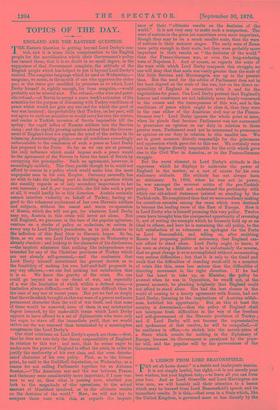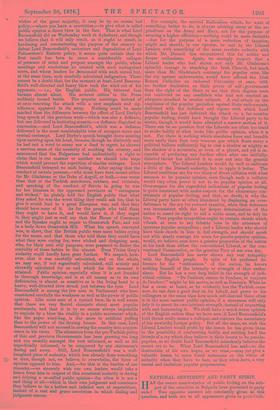A LESSON FROM LORD BEACONSFIELD.
"VAS est ab hosts doceri" is a feeble and inadequate mmdm It is not simply lawful, but right,—it is not merely your best wisdom, but your highest duty,—to learn all you can from your foes. And as Lord Granville and Lord Hartington are wise men, we will humbly call their attention to a lesson which may be learned from Lord Beaconsfield's speech and its immediate results. It is this,—that even in a State which, like the United Kingdom, is governed more or less directly by the wishes of the great majority, it may be by no means bad policy,—where you have a conviction,—to give what is called public opinion a direct blow in the face. That is what Lord Beaconsfield did on Wednesday week at Aylesbury, and though we believe that it will only result, as it ought to result, in hardening and concentrating the purpose of the country to defeat Lord Beaconsfield's caricature and degradation of Lord Palmerston's Eastern policy, it seems quite certain that its first result has been to cause a considerable collapse of presence of mind and purpose amongst the public, whose meetings and resolutions he treated with such undisguised scorn, and whose leaders he denounced with such unreal but, at the same time, such carefully calculated indignation. There cannot be a doubt that, for the moment at least, Lord Beacons- field's well-directed and heavy blow took the wind out of his opponent, — i.e., the English public. Hist bitterest foes became almost silent. His severest critics in the Press suddenly turned feeble. The popular meetings, instead of at once renewing the attack with a new emphasis and sig- nificance, appeared to die away. Nothing could be more marked than the difference between the effect of Lord Derby's long speech of the previous week—which was also a defiance, but one delivered in hesitating accents,—a defiance disguised as concession,—and Lord Beaconsfield's, which was a defiance delivered in the most unmistakable tone of arrogant scorn and cynical contempt. Lord Derby's speech brought down meeting upon meeting upon his head, because, though he distinctly said he had not a word to unsay nor a deed to regret, he showed a nervous sense of the necessity of soothing the country, and announced that the Bulgarians had undoubtedly a right to claim that in one manner or another we should take steps which would prevent the repetition of similar outrages. Lord Beaconsfield betrayed no such feeling. After saying that the conduct of certain persons,—who must have been meant either for Mr. Gladstone or the Duke of Argyll, or both,—was worse than that of the Turkish murderers, robbers, and violators, and speaking of the conduct of Servia in going to war for her kinsmen in the oppressed provinces as "outrageous and wicked," he plainly told the English public that what they asked for was the worst thing they could ask for, that to give it would lead to a great European war, and that they should have none of it. As for the people who told them they ought to have it, and would have it, if they urged it, they might just as well say that the House of Commons and the Speaker ought to repair to Greenwich Fair, and roll in a body down Greenwich Hill. What his speech conveyed was, in short, that the British public were mere babies crying for the moon, and that those who told them they could have what they were crying for, were wicked and designing men, who, for their own evil purposes, were prepared to flatter the credulity of these babies to the utmost. Even Vivian Grey's audacity could hardly have gone further. We suspect, how- ever, that it was carefully calculated, and on the whole, we may say, if not sagaciously calculated, still acutely and shrewdly calculated for an end which for the moment it attained. Public opinion, especially when it is not founded in thorough knowledge, and is at all uneasy as to its own deficiencies, is almost as sensitive as is the living head to a heavy, well-directed blow struck just between the eyes. Lord Beaconsfield is among the few men in Parliament who have considered carefully the weakness as well as the power of public opinion Like most men of a cynical turn, he is well aware that there are very flaccid elements about, most popular sentiments, and that it is by no means always impossible to explode by a blow the vitality in a public movement which, like the paper wind-bag, is due more to artificial puffing than to the power of the flowing breeze. In this case, Lord Beaconsfield will not succeed in cowing the country into acquies- cence in his views. The alienation from the pro-Turkish policy of this and previous Governments has been growing too long and too steadily amongst the best informed, as well as the superficially informed, to be conquered by any statesman's daring and scorn. Still, Lord Beaconsfield's was a well- imagined piece of audacity, which has already done something to attar, though not, we believe, to overwhelm, the force of opinion opposed to him. And,—for this is the burden of our remarks,—we sincerely wish our own leaders would take a lesson from him in respect of this occasional audacity in daring and defying a so-called public opinion—for often it is not a real thing at all—which in their own judgment and conscience they believe to be a hollow and inflated sort of superstition, instead of a real and grave conviction in which feeling and judgment concur. For example, the morbid Radicalism which, for want of something better to do, is always nibbling away at the ex- penditure on the Army and Navy, not for the purpose of securing a higher efficiency—nothing could be more desirable —but for the purpose of a mere reduction of taxation, might and should, in our opinion, be met by the Liberal Leaders with something of the same resolute audacity with which Mr. Disraeli has encountered this far nobler and deeper enthusiasm. Again, we strongly suspect that a Liberal leader who had shown not only Mr. Gladstone's splendid courage in attacking the Irish Church, but much more than Mr. Gladstone's contempt for popular cries, like the cry against endowments, would have offered the Irish Roman Catholics an endowed University at once, with no further limitation on their power of self - government than the right of the State to see that their degrees were not conferred on any candidate who had not reached an adequate standard in secular subjects. A real attack on the emptiness of the popular prejudice against State endowments, delivered with the boldness and vigour with which Lord Beaconsfield has just delivered the attack on a far sounder popular feeling, would have brought the Liberal party to its senses, though it would have alienated a narrow section of it. There can be no question that the Liberals are often too timid to strike boldly at what looks like public opinion, when it is not. For there is nothing which simulates force and breadth more easily than that very tenuous gas which floats many a political balloon sufficiently big to cast a shadow as mighty as the shadow of a mountain, or even of a planet, and yet is in- capable of producing any further effect after one skilfully- directed thrust has allowed it to ooze out into the general atmosphere. The Liberal Leaders would do well to cultivate a little of the Disraeli audacity, but to apply it better. The Liberal traditions are far too chary of direct collision with what assumes to be popular opinion, even though such a collision would very often prove it not to be popular opinion at all. Over-respect for the superficial indications of popular feeling is quite consistent with under-respect for the elementary con- stituents of popular feeling, and that, no doubt, is why the Liberal party have so often blundered by displaying an over- deference to the cry for reduced taxation, when that deference was inconsistent with the far deeper determination of the nation to assert its right to aid a noble cause, and to defy its foes. True popular sympathies ought to contain chords which vibrate at once to any falsetto tone in the utterance of spurious popular sympathies ; and a Liberal leader who should have these chords in him in full strength, and should speak out with manly courage his scorn for pseudo-popular opinion, would, we believe, soon have a greater proportion of the nation at his back than either the conventional Liberal, or the con- ventional Conservative, or the genuine Tory of our own day.
Lord Beaconsfield has never shown any real sympathy with the English people. In spite of his professed de- ference for the "enthusiasm" of the nation, he knows nothing himself of the intensity or strength of that enthu- siasm. But he has a very deep belief in the strength of indi- vidual volition. "De l'audace, encore de l'audace, et toujours de l'audacel" might be his motto, as well as Denton's. When he has a cause at heart, as he evidently has the Turkish cause now, he can dare a good deal on its behalf, and prove to his colleagues at the same time how much self-distrust there often is in the most earnest public opinion, if a statesman will only defy it to assert its own intrinsic strength, instead of coquetting with and humouring it. We shall have a much worse opinion of the English nation than we have now, if Lord Beaconsfield's bold thrust really causes a collapse, and restores the ascendancy of his unworthy foreign policy. But all the same, we wish the Liberal Leaders would profit by the lesson he has given them in the possibility of confronting boldly and smiting hard the friends of a cry which they believe in their hearts to be pseudo- popular, as no doubt Lord Beaconsfield mistakenly believes the recent cry to be. What Lord Beaconsfield has said—to the destruction of his own hopes, as we trust,—may yet give a valuable lesson to more timid statesmen on the virtue of audacity when they have to face, as they often have, a very unreal and factitious popular prepossession.



































 Previous page
Previous page